介词短语例句
- 格式:doc
- 大小:38.00 KB
- 文档页数:3
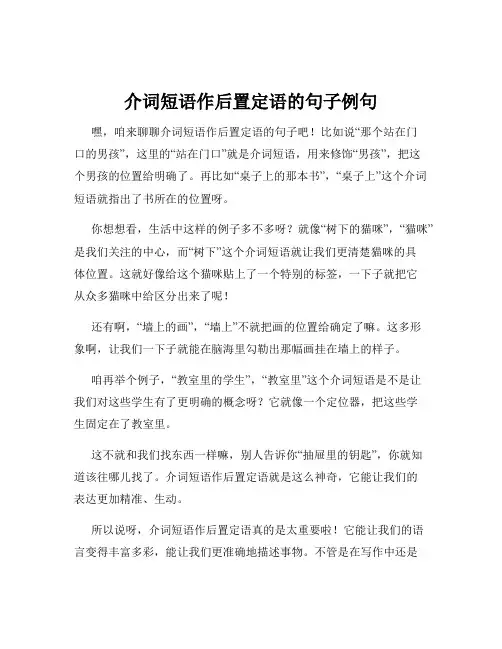
介词短语作后置定语的句子例句嘿,咱来聊聊介词短语作后置定语的句子吧!比如说“那个站在门
口的男孩”,这里的“站在门口”就是介词短语,用来修饰“男孩”,把这个男孩的位置给明确了。
再比如“桌子上的那本书”,“桌子上”这个介词短语就指出了书所在的位置呀。
你想想看,生活中这样的例子多不多呀?就像“树下的猫咪”,“猫咪”是我们关注的中心,而“树下”这个介词短语就让我们更清楚猫咪的具
体位置。
这就好像给这个猫咪贴上了一个特别的标签,一下子就把它
从众多猫咪中给区分出来了呢!
还有啊,“墙上的画”,“墙上”不就把画的位置给确定了嘛。
这多形象啊,让我们一下子就能在脑海里勾勒出那幅画挂在墙上的样子。
咱再举个例子,“教室里的学生”,“教室里”这个介词短语是不是让我们对这些学生有了更明确的概念呀?它就像一个定位器,把这些学
生固定在了教室里。
这不就和我们找东西一样嘛,别人告诉你“抽屉里的钥匙”,你就知道该往哪儿找了。
介词短语作后置定语就是这么神奇,它能让我们的
表达更加精准、生动。
所以说呀,介词短语作后置定语真的是太重要啦!它能让我们的语言变得丰富多彩,能让我们更准确地描述事物。
不管是在写作中还是
日常交流中,都有着不可或缺的作用呢!咱可得好好掌握这个知识点呀,你说是不是?。
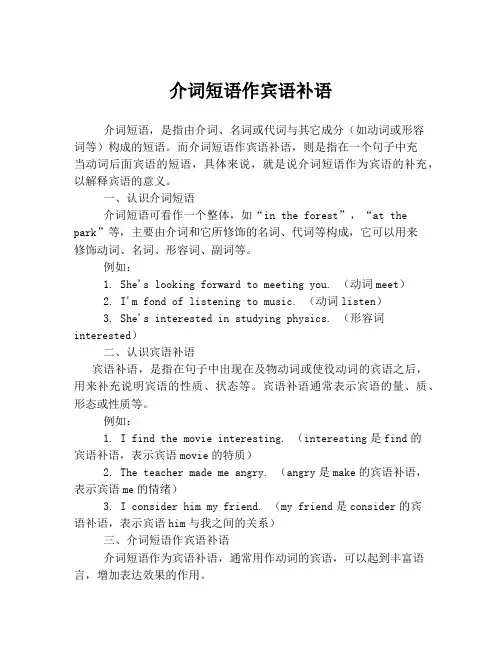
介词短语作宾语补语介词短语,是指由介词、名词或代词与其它成分(如动词或形容词等)构成的短语。
而介词短语作宾语补语,则是指在一个句子中充当动词后面宾语的短语,具体来说,就是说介词短语作为宾语的补充,以解释宾语的意义。
一、认识介词短语介词短语可看作一个整体,如“in the forest”,“at the park”等,主要由介词和它所修饰的名词、代词等构成,它可以用来修饰动词、名词、形容词、副词等。
例如:1. She's looking forward to meeting you. (动词meet)2. I'm fond of listening to music. (动词listen)3. She's interested in studying physics. (形容词interested)二、认识宾语补语宾语补语,是指在句子中出现在及物动词或使役动词的宾语之后,用来补充说明宾语的性质、状态等。
宾语补语通常表示宾语的量、质、形态或性质等。
例如:1. I find the movie interesting. (interesting是find的宾语补语,表示宾语movie的特质)2. The teacher made me angry. (angry是make的宾语补语,表示宾语me的情绪)3. I consider him my friend. (my friend是consider的宾语补语,表示宾语him与我之间的关系)三、介词短语作宾语补语介词短语作为宾语补语,通常用作动词的宾语,可以起到丰富语言,增加表达效果的作用。
例如:1. I'm looking forward to seeing you again. (看起来让人期待,增加语言的感情色彩)2. Can you help me with my homework? (with my homework 表示帮助的具体内容)3. I'm tired of hearing you complain. (of hearing you complain表示不愿意再听到某人的特定举动)四、注意事项在理解介词短语作宾语补语的时候,需要注意几点:1. 介词短语一般要放在及物动词之后。
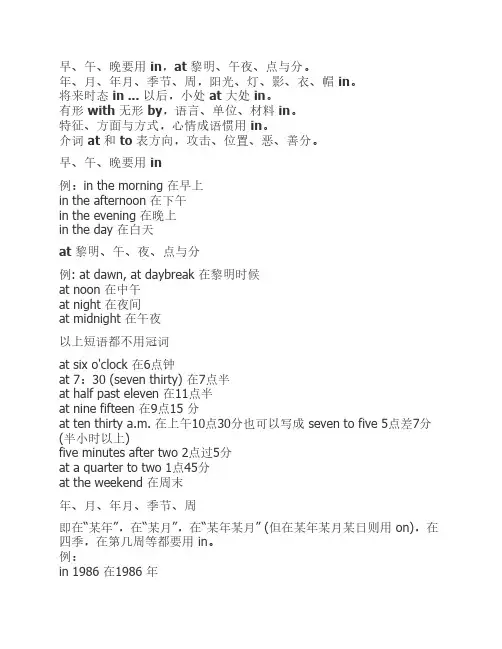
早、午、晚要用 in,at 黎明、午夜、点与分。
年、月、年月、季节、周,阳光、灯、影、衣、帽 in。
将来时态 in ... 以后,小处 at 大处 in。
有形 with 无形 by,语言、单位、材料 in。
特征、方面与方式,心情成语惯用 in。
介词 at 和 to 表方向,攻击、位置、恶、善分。
早、午、晚要用 in例:in the morning 在早上in the afternoon 在下午in the evening 在晚上in the day 在白天at 黎明、午、夜、点与分例: at dawn, at daybreak 在黎明时候at noon 在中午at night 在夜间at midnight 在午夜以上短语都不用冠词at six o'clock 在6点钟at 7:30 (seven thirty) 在7点半at half past eleven 在11点半at nine fifteen 在9点15 分at ten thirty a.m. 在上午10点30分也可以写成 seven to five 5点差7分(半小时以上)five minutes after two 2点过5分at a quarter to two 1点45分at the weekend 在周末年、月、年月、季节、周即在“某年”,在“某月”,在“某年某月” (但在某年某月某日则用 on),在四季,在第几周等都要用 in。
例:in 1986 在1986 年in 1927 在1927 年in April 在四月in March 在三月in December, 1986 1986年12月in July, l983 1983年7月in spring 在春季 in summer 在夏季in autumn 在秋季 in winter 在冬季in the fist week of this semester 这学期的第一周in the third week 在第三周阳光、灯、影、衣、冒 in,即在阳光下,在灯下,在树阴下,穿衣、着装、冒雨等都要用 in。
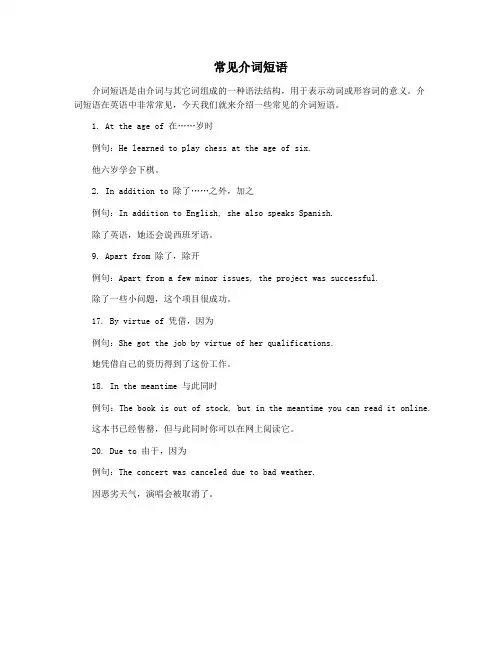
常见介词短语
介词短语是由介词与其它词组成的一种语法结构,用于表示动词或形容词的意义。
介词短语在英语中非常常见,今天我们就来介绍一些常见的介词短语。
1. At the age of 在……岁时
例句:He learned to play chess at the age of six.
他六岁学会下棋。
2. In addition to 除了……之外,加之
例句:In addition to English, she also speaks Spanish.
除了英语,她还会说西班牙语。
9. Apart from 除了,除开
例句:Apart from a few minor issues, the project was successful.
除了一些小问题,这个项目很成功。
17. By virtue of 凭借,因为
例句:She got the job by virtue of her qualifications.
她凭借自己的资历得到了这份工作。
18. In the meantime 与此同时
例句:The book is out of stock, but in the meantime you can read it online.
这本书已经售罄,但与此同时你可以在网上阅读它。
20. Due to 由于,因为
例句:The concert was canceled due to bad weather.
因恶劣天气,演唱会被取消了。
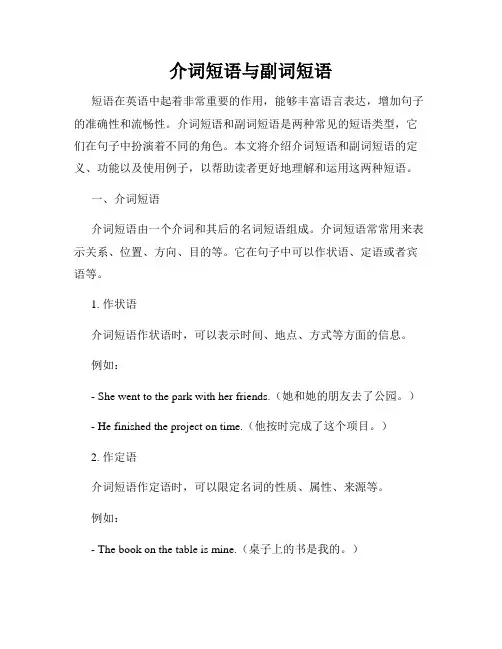
介词短语与副词短语短语在英语中起着非常重要的作用,能够丰富语言表达,增加句子的准确性和流畅性。
介词短语和副词短语是两种常见的短语类型,它们在句子中扮演着不同的角色。
本文将介绍介词短语和副词短语的定义、功能以及使用例子,以帮助读者更好地理解和运用这两种短语。
一、介词短语介词短语由一个介词和其后的名词短语组成。
介词短语常常用来表示关系、位置、方向、目的等。
它在句子中可以作状语、定语或者宾语等。
1. 作状语介词短语作状语时,可以表示时间、地点、方式等方面的信息。
例如:- She went to the park with her friends.(她和她的朋友去了公园。
)- He finished the project on time.(他按时完成了这个项目。
)2. 作定语介词短语作定语时,可以限定名词的性质、属性、来源等。
例如:- The book on the table is mine.(桌子上的书是我的。
)- The students from China are studying abroad.(来自中国的学生在国外学习。
)3. 作宾语介词短语还可作动词或者名词的宾语,表示行为的目的、方式、方向等。
例如:- We talked about the plan.(我们谈论了计划。
)- He is good at playing basketball.(他擅长打篮球。
)二、副词短语副词短语由一个副词和其后的短语组成。
副词短语常用来修饰动词、形容词或者其他副词,用以表示方式、程度、频率等。
1. 修饰动词副词短语可用于修饰动词,表示动作发生的方式或者频率。
例如:- She sings beautifully.(她唱得很美。
)- They often go hiking on weekends.(他们经常在周末去徒步旅行。
)2. 修饰形容词副词短语也可以修饰形容词,表示程度或者评价。
例如:- The movie is extremely interesting.(这部电影非常有趣。
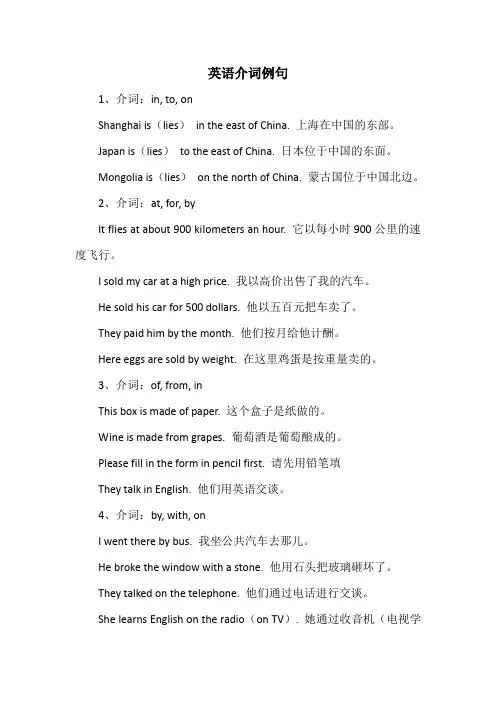
英语介词例句1、介词:in, to, onShanghai is(lies)in the east of China. 上海在中国的东部。
Japan is(lies)to the east of China. 日本位于中国的东面。
Mongolia is(lies)on the north of China. 蒙古国位于中国北边。
2、介词:at, for, byIt flies at about 900 kilometers an hour. 它以每小时900公里的速度飞行。
I sold my car at a high price. 我以高价出售了我的汽车。
He sold his car for 500 dollars. 他以五百元把车卖了。
They paid him by the month. 他们按月给他计酬。
Here eggs are sold by weight. 在这里鸡蛋是按重量卖的。
3、介词:of, from, inThis box is made of paper. 这个盒子是纸做的。
Wine is made from grapes. 葡萄酒是葡萄酿成的。
Please fill in the form in pencil first. 请先用铅笔填They talk in English. 他们用英语交谈。
4、介词:by, with, onI went there by bus. 我坐公共汽车去那儿。
He broke the window with a stone. 他用石头把玻璃砸坏了。
They talked on the telephone. 他们通过电话进行交谈。
She learns English on the radio(on TV). 她通过收音机(电视学英语)。
5、介词:of, about, onHe spoke of the film the other day. 他前几天提到了这部影片。
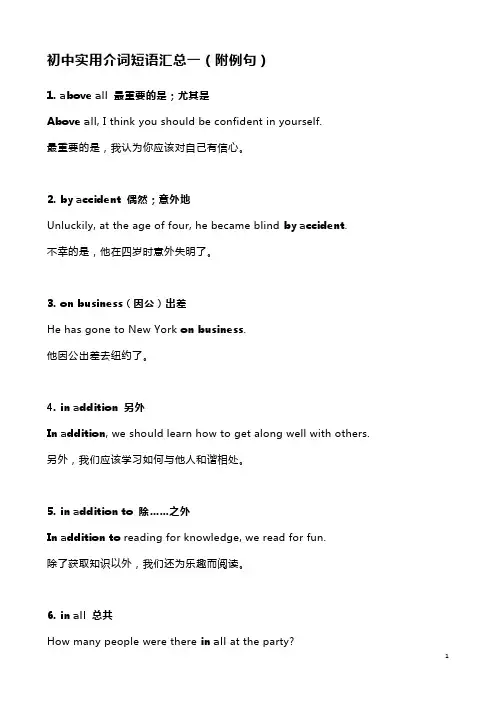
初中实用介词短语汇总一(附例句)1. above all 最重要的是;尤其是Above all, I think you should be confident in yourself.最重要的是,我认为你应该对自己有信心。
2. by accident 偶然;意外地Unluckily, at the age of four, he became blind by accident.不幸的是,他在四岁时意外失明了。
3. on business(因公)出差He has gone to New York on business.他因公出差去纽约了。
4. in addition 另外In addition, we should learn how to get along well with others. 另外,我们应该学习如何与他人和谐相处。
5. in addition to 除……之外In addition to reading for knowledge, we read for fun.除了获取知识以外,我们还为乐趣而阅读。
6. in all 总共How many people were there in all at the party?共有多少人出席了聚会?7. on average 平均;一般地Chinese workers have only ten days of paid leave on average.中国劳动者平均只有10天带薪假期。
8. at / in / from the beginning 在开始的时候English is difficult to learn at the beginning.英语一开始很难学。
Vincent van Gogh was not a painter from the beginning.起初,文森特·梵高并不是画家。
9. at the beginning of 在……开始In China, we start our summer vacation at the beginning of July. 在中国,我们七月初开始放暑假。
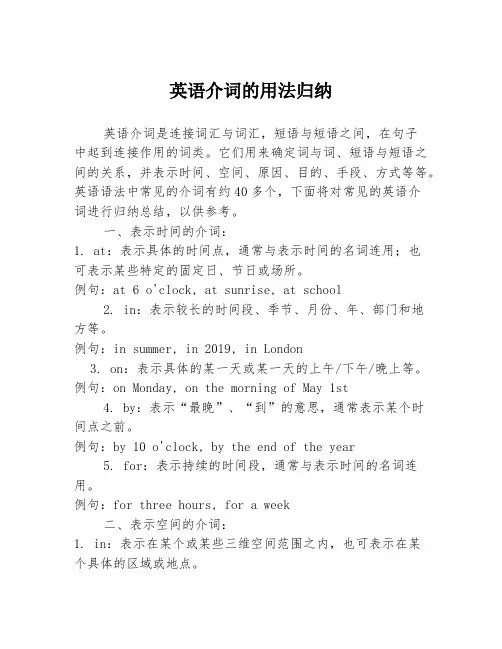
英语介词的用法归纳英语介词是连接词汇与词汇,短语与短语之间,在句子中起到连接作用的词类。
它们用来确定词与词、短语与短语之间的关系,并表示时间、空间、原因、目的、手段、方式等等。
英语语法中常见的介词有约40多个,下面将对常见的英语介词进行归纳总结,以供参考。
一、表示时间的介词:1. at:表示具体的时间点,通常与表示时间的名词连用;也可表示某些特定的固定日、节日或场所。
例句:at 6 o'clock, at sunrise, at school2. in:表示较长的时间段、季节、月份、年、部门和地方等。
例句:in summer, in 2019, in London3. on:表示具体的某一天或某一天的上午/下午/晚上等。
例句:on Monday, on the morning of May 1st4. by:表示“最晚”、“到”的意思,通常表示某个时间点之前。
例句:by 10 o'clock, by the end of the year5. for:表示持续的时间段,通常与表示时间的名词连用。
例句:for three hours, for a week二、表示空间的介词:1. in:表示在某个或某些三维空间范围之内,也可表示在某个具体的区域或地点。
例句:in the room, in the park2. on:表示在某个平面面上,通常用来表示地点。
例句:on the table, on the wall3. at:表示在某个具体的地点或位置。
例句:at the door, at the bus stop4. by:表示“靠近”、“经过”等含义。
例句:by the river, by the window5. between:表示在两个或两个以上的物体或位置之间。
例句:between two mountains, between the buildings6. among:表示在三个或三个以上的物体或位置之间。

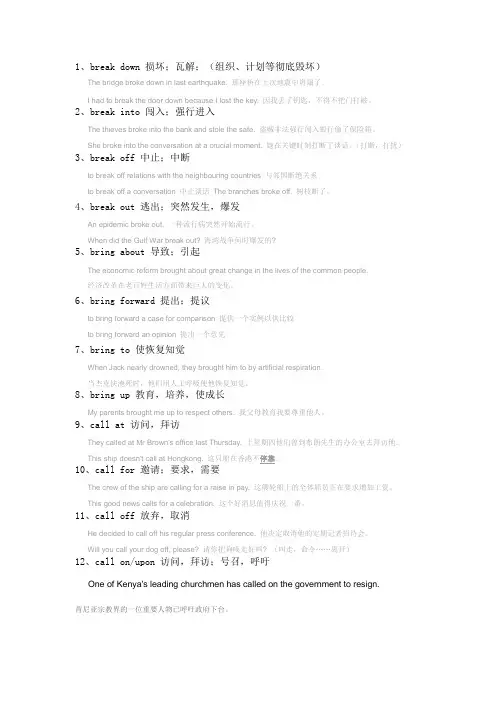
1、break down 损坏;瓦解;(组织、计划等彻底毁坏)The bridge broke down in last earthquake.那座桥在上次地震中坍塌了。
I had to break the door down because I lost the key.因我丢了钥匙,不得不把门打破。
2、break into 闯入;强行进入The thieves broke into the bank and stole the safe.盗贼非法强行闯入银行偷了保险箱。
She broke into the conversation at a crucial moment.她在关键时刻打断了谈话。
(打断,打扰)3、break off 中止;中断to break off relations with the neighbouring countries与邻国断绝关系to break off a conversation中止谈话The branches broke off.树枝断了。
4、break out 逃出;突然发生,爆发An epidemic broke out.一种流行病突然开始流行。
When did the Gulf War break out?海湾战争何时爆发的?5、bring about 导致;引起The economic reform brought about great change in the lives of the common people.经济改革在老百姓生活方面带来巨大的变化。
6、bring forward 提出;提议to bring forward a case for comparison提供一个实例以供比较to bring forward an opinion提出一个意见7、bring to 使恢复知觉When Jack nearly drowned, they brought him to by artificial respiration.当杰克快淹死时,他们用人工呼吸使他恢复知觉。
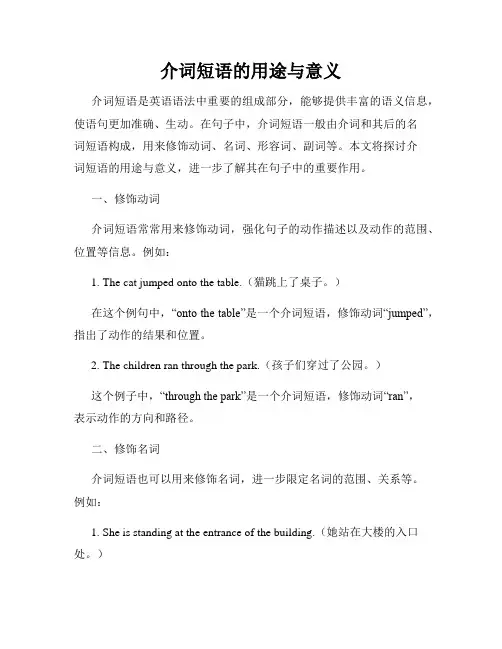
介词短语的用途与意义介词短语是英语语法中重要的组成部分,能够提供丰富的语义信息,使语句更加准确、生动。
在句子中,介词短语一般由介词和其后的名词短语构成,用来修饰动词、名词、形容词、副词等。
本文将探讨介词短语的用途与意义,进一步了解其在句子中的重要作用。
一、修饰动词介词短语常常用来修饰动词,强化句子的动作描述以及动作的范围、位置等信息。
例如:1. The cat jumped onto the table.(猫跳上了桌子。
)在这个例句中,“onto the table”是一个介词短语,修饰动词“jumped”,指出了动作的结果和位置。
2. The children ran through the park.(孩子们穿过了公园。
)这个例子中,“through the park”是一个介词短语,修饰动词“ran”,表示动作的方向和路径。
二、修饰名词介词短语也可以用来修饰名词,进一步限定名词的范围、关系等。
例如:1. She is standing at the entrance of the building.(她站在大楼的入口处。
)在这个例句中,“at the entrance of the building”是一个介词短语,修饰名词“entrance”,指明了所站立的具体位置。
2. The book on the table is mine.(桌子上的书是我的。
)这个例子中,“on the table”是一个介词短语,修饰名词“book”,说明了书的位置和归属。
三、修饰形容词和副词除了修饰动词和名词,介词短语还可以修饰形容词和副词,增加句子的描写和修饰程度。
例如:1. The movie was very interesting to me.(这部电影对我来说非常有趣。
)在这个例句中,“to me”是一个介词短语,修饰形容词“interesting”,表示对我而言的程度。
2. He ran extremely fast for his age.(考虑到他的年龄,他跑得非常快。
最重要的是,我认为你应该对自己有信心。
不幸的是,他在四岁时意外失明了。
他因公出差去纽约了。
另外,我们应该学习如何与他人和谐相处。
除了获取知识以外,我们还为乐趣而阅读。
共有多少人出席了聚会?中国劳动者平均只有 10 天带薪假期。
English英语一开始很难学。
Vincent van Gogh起初,文森特·梵高并不是画家。
在中国,我们七月初开始放暑假。
我们今天下午顶多能完成一半的工作。
我的工作时间是八点至五点,中间有午餐休息时间。
机上 239 人全部遇难。
Jim thanked吉姆衷心地向她表示感谢。
万事皆有因,没有什么事是因巧合而发生的。
She practices spoken English both她课上课下都练习英语口语。
总之,你能从这次旅行中收获很多。
那栋房子归谁管?Happiness幸福即将来临。
— Can I borrow your pencil? 我能借用你的铅笔吗?—当然可以。
— I hope you don’t mind my opening the window.希望你不介意我打开窗户。
—’s much too hot in here.当然不介意。
这里太热了。
我们想拯救濒危动物。
他至今还很受欢迎。
Eric rode the beach.埃里克朝着海滩的方向骑去。
Some她的一些非常有名的照片将在这次展览中展出。
The那幅画远看很美。
The of tea.毫无疑问,中国人最了解茶的特性。
今天我值日。
What you doing?你究竟在做什么?— By the way, where is the bus stop?顺便问一下,公交车站在哪里?—在这条街的尽头。
We had learned all the songs到上个月末为止,我们已经学了所有的歌曲。
最后,英国队获胜。
The stadium was named Mr White.为了纪念怀特先生,该体育馆以他的名字命名。
介词for的用法
介词for一个常见的英语介词,它有许多不同的用法,但它的主要用法却只有两种:表示时间、原因或目的。
下面是介词for的具体用法:
一、表示时间
1. 一段时间:
for +间段
例句:
I staying home for the weekend.
2. 一段时间以内:
for +词/介词短语 +间
例句:
I going to the store for a few hours.
3. 一段时间后:
for + 一段时间 +
例句:
I be back in a week for after.
二、表示原因或目的
1. 为了:
for +示原因的名词/介词短语
例句:
I went to the store for chips.
2.为:
for +词/介词短语 +的
例句:
I going to the store for groceries.
三、表示理由
1. 为什么:
for +示理由的名词/介词短语
例句:
I here for a reason.
2.为:
for +词/介词短语 +由
例句:
I here for the meeting.
介词for的用法概述
介词for许多应用,但最常见的用法还是表示时间、原因或目的。
它还可以用来表示理由。
一般而言,介词for跟一个具体的名词或介词短语。
以上就是介词for用法总结。
高中英语常用介词短语(经典10篇)hold介词短语搭配篇一hold onto (v.+prep.)hold out (v.+adv.)hold over (v.+adv.)hold to (v.+prep.)hold together (v.+adv.)hold up (v.+adv.)hold with (v.+prep.)用作名词(n.):catch hold ofget hold ofhave a hold over〔on, upon〕keep hold oflay hold oftake hold of〔on〕例句:1、I'm not going to believe it myself, never mind convince anyone else.我自己都不会相信,更别提说服别人了。
2、It became clear that I hadn't been able to convince Mike.我显然没有能够说服迈克。
3、You'll need to convince them of your enthusiasm for the job.你要使他们相信你殷切希望得到这份工作。
常用英语介词短语篇二1、above one’s own.。
. 在自己的……之上2、above average 在平均水平以上3、according to根据4、after all 毕竟5、along with与……一道,连同……一起6、apart from除……之外7、as a result的结果8、as a result of 作为。
.。
.。
.的结果9、as well as 也,还有10、be convinced of sth.坚信。
.。
.。
.11、be curious about sth对某事物感到好奇12、because of因为一三、below average 在平均水平以下14、beyond control 无法控制壹五、beyond description 无法描述16、beyond reach 无法到达一qi、beyond repair 无法修理18、by chance偶然地,碰巧地19、by means of通过……的方式20、by nature天生地21、by oneself单独地,独自地22、except for除了23、far from远离;远远不24、in front of在……的前面25、in general大体上,总体上26、in honour of为了纪念27、in need of需要,紧缺28、in one’s mind在某人心里29、in other words 换句话说30、in place在适当的地方31、in place of代替32、in praise of歌颂,赞美33、in return作为回报34、in search of寻找35、in short简言之36、in sight(被)看得见37、in spite of尽管38、in terms of就……而言39、in the direction of朝……方向40、in the form of以……形式41、in turn轮流42、in vain徒劳43、in addition to除了=besides44、in case万一,以防……45、in case of 万一46、in detail 详细地,详尽地47、in all 总共48、instead of代替,而不是49、in doubt怀疑50、in effect生效,在实行中51、in exchange for作为。
TO为介词的常见短语和例句(4.27)1.be/get/become used to 习惯于I have been used to getting up early. 我早已习惯早起。
2.be given to 沉溺于She is given to drinking. 她沉溺于喝酒。
3.be related to和…有联系… His fear of people is deeply related to his unhappy childhood 他对人的畏惧和他不幸的孩提时代有着密切的关系。
4.be addicted to沉溺于…;对…上瘾. She is addictaded to drugs.他吸毒成隐瘾。
5.be opposed to 反对She is strongly opposed to their plan.他强烈反对他们的计划。
6.devote oneself to献身于。
She devoted herself to tennis in her teens. 他少女时代热衷网球. 。
7.be admitted to被…录取, 准进入Li Ming is admitted to Beijing University.李明被北大录取。
Children under 18 are not admitted to the film。
未满18岁儿童不得入场看这场电影8.be reduced to沦为He was reduced to begging in the street.他沦为沿街乞。
reduce… to 使…沦为. Hunger reduced him to stealing.饥饿使他沦为盗贼。
9.be attached to附属于,爱慕,爱恋,敬仰The middle school is attached toQing hua University。
这是清华附中。
10.be adjusted to 适应She was soon adjusted to his way of life 他很快适应了他的生活方式。
【高中英语】高中阶段常见带介词的to短语例句归纳(一) 1.accessto接近,进入(某地的)方法;通路
通往大楼的唯一通道是一条长长的泥泞小路。
到那栋建筑的唯一通路是沿着那条泥泞的路走。
2.根据
theworkwasdoneaccordingtohisinstructions.
这项工作是按照他的指示做的。
3.beaddictedto沉溺于……,对……上瘾
他对毒品上瘾了。
他上了毒瘾。
4.属于属于
thisdictionarybelongstome.
这本字典是我的。
5.contributeto为……做贡献,为……撰稿
每个人都应该为社会做出贡献。
人人都应该尽自己的能力为社会做贡献。
6.献身于
hehasdevotedhislifetohelpingdisabledpeople.
他毕生致力于帮助残疾人。
7.dueto因为,由于……而起
他的迟到是由于交通拥挤所致。
他迟到是因高速公路上车辆过多所致。
8.等于。
能够胜任
billisquiteequaltorunningtheoffice.
比尔有能力管理这个部门。
9.getcloseto靠近,接近
今天,许多人都在进行自我保护。
如今许多人喜欢到户外去接近大自然。
10.开始做某事并认真处理某事
it’stimeigotdowntosomeseriouswork.
我该开始谈正事了。
介词短语的作用介词短语是英语中的一个重要语法结构,由介词和其后的名词短语组成,可以在句子中充当多种不同的语法角色,对于句子的结构和意义起着关键的作用。
本文将探讨介词短语的不同作用和用法。
一、定语的作用介词短语可以充当定语,修饰名词或代词,进一步限定或描述名词的具体属性。
它可以回答“哪一个”、“什么样的”等问题,提供额外的信息。
例如:1. She lives in a house near the river.(在河附近的房子)2. The boy with glasses is my brother.(戴眼镜的男孩)在以上两个例句中,介词短语“near the river”和“with glasses”分别修饰了名词“house”和“boy”,进一步描述了它们的特征。
二、宾语的作用介词短语可以作为动词的宾语,与一些特定的动词搭配使用。
这些动词需要后面跟着特定的介词,形成固定的短语。
例如:1. He apologized to me for being late.(因为迟到向我道歉)2. She insisted on going to the party.(坚持去参加派对)在以上两个例句中,介词短语“to me”和“on going to the party”分别作为动词“apologized”和“insisted”的宾语,表明动作的对象或方向。
三、状语的作用介词短语还可以作为状语,修饰动词、形容词或副词,表示时间、地点、原因、方式等。
它可以回答“在哪里”、“怎样”、“为什么”等问题,补充详细的情况。
例如:1. He ran to the store to buy some groceries.(跑到商店买杂货)2. They were excited about the upcoming trip.(对即将到来的旅行感到兴奋)在以上两个例句中,介词短语“to the store”和“about the upcoming trip”分别修饰了动词短语“ran”和“excited”,提供了动作发生的地点和情感的原因。
介词短语
的相关例句
1. Three plus six makes nine.
3加6等于9.(注意,此句中的plus是介词,plussix是介词短语,作three
的定语,因此,动词用makes, 不用make ) .
来自《用法词典》
2. Moreover, the locative environment is mainly realized a locative prepositional phrase.
另外, 处所环境主要由处所介词短语加以体现.
来自互联网
3. This paper proposes a hybrid algorithm to identify Chinese prepositional phrase.
本文运用规则和统计相结合的方法构造了一个汉语介词短语识别算法.
来自互联网
4. You use some adverbs of degree to modify clauses and prepositional phrases.
有些程度副词可修饰从句或介词短语.
来自互联网
5. Adverbials are usually adverbs, adverb phrases, or prepositional phrases.
状语通常由副词, 副词短语或介词短语构成.
来自互联网
6. He finds the mass of materials before as well as after experiments.
他不但试验后,还在试验前求出材料的质量. (连接介词短语).
来自互联网
7. This dissertation adopts a functional approach to locative prepositional phrases.
本论文对处所介词短语进行功能研究.
来自互联网
8. Austrians were in the woods.
(后接介词短语)奥地利人在树林里.
来自互联网
9. What is the function of the prepositional phrase?
这个介词短语的作用是什么?
来自互联网
10. The prepositional phrase here is used adverbially.
这个介词短语在这里用作副词.
来自互联网
11. This paper deals With the usage of prepositional phrase indicating continuous sense in view of semantics.
从语义学的角度,对介词短语表进行意义的用法进行探讨.
来自互联网
12. In addition a locative prepositional phrase is mainly a locative preposition and a nominal group.
此外,处所介词短语主要由处所介词加名词词组组合而成.
来自互联网
13. In fact a locative prepositional phrase is the general name of spatiotemporal prepositional phrases.
实际上,处所介词短语是时空介词短语的总称.
来自互联网
14. Premier Zhou knew three foreign languages , that is ( namely ) English , Japanese and French.
like引导的介词短语在句中作插入语.
来自互联网
15. Moreover, the investigation of locative prepositional phrases helps find the spatiotemporal principles in locating experience.
此外, 对处所介词短语的考察有助于找到处所经验的时空规律.
来自互联网
16. I argue that locative prepositional phrases are taken as a lexicogrammatical pattern to recognize genre types.
我认为作为一种词汇语法模式的处所介词短语可以用于识别语类类型.
来自互联网
17. When using prepositional phrases as adverbial , Thai students often commit numerous transfer errors while learning Chinese.
在泰国学生学习汉语中,使用介词短语作状语时, 出现了大量移位性的偏
误.
来自互联网
18. Therefore, its syntactic position is not as flexible as that of a locative prepositional phrase.
然而, 其句法位置不如处所介词短语灵活.
来自互联网
19. After reading the book, I got to know something about electricity.
(介词+动名词短语)把这本书读完之后, 我开始对电有所了解.
来自互联网
20. Write these words and phrases the correct box at or in.
下词和短语列入正确的介词栏中.
来自互联网
21. Write these words and phrases in the correct box with at or in.
将以下词和短语列入正确的介词栏中.。